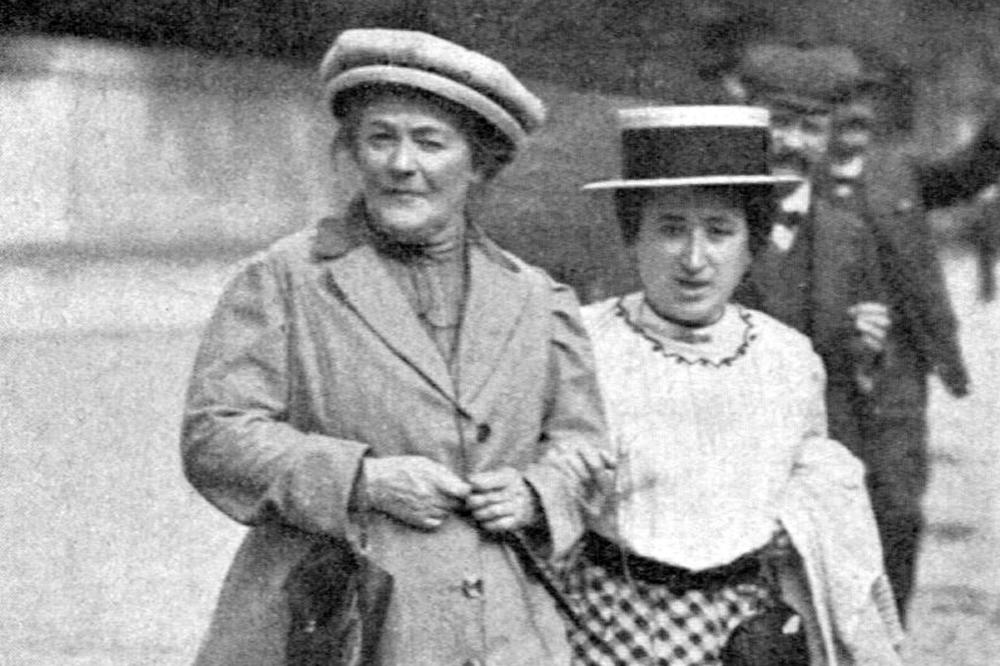European, Icon of the Left, Martyr of the Revolution
Rosa Luxemburg was born 150 years ago, on March 5, 1871.
Mar 04, 2021
Side by side: Rosa Luxemburg (at right) in April 1915 with women's rights advocate Clara Zetkin (1857–1933). Zetkin organized the first International Women's Day in 1911. It has been celebrated on March 8 around the world for well over a century.
Image Credit: picture alliance / CPA Media Co. Ltd.
What do people remember about Rosa Luxemburg? And how did she become who she was? A quote, “Freedom is always freedom for those who think differently,” actually only a half-sentence, noted in the margin of a manuscript while she was in prison. Her death as a martyr of the communist revolution, shot by members of a German Reich defense unit and thrown into the Berlin Landwehr Canal.
Icon of the German Left
Born 150 years ago as “Rozalia Luksenburg” in Russian-occupied Poland as the daughter of a timber merchant, she first became a Polish social democrat, then a European intellectual and revolutionary, and finally an icon of the German left. Her life and thinking were turbulent and ambivalent enough to never be completely co-opted and never completely forgotten.
Jürgen Kocka, a social historian and professor emeritus at Freie Universität Berlin specialized in the history of the industrialized world, sees Luxemburg’s “complex, impressive, sometimes admirable personality” as one of the reasons for her status as an icon of the political left. She was educated, “polyglot, at the same time a political activist with assertiveness and a charismatic speaker.” She had to overcome numerous hurdles in order to assert herself: as a woman, as a Jew, as an activist born in Russian Poland, who in Germany combined the “practice of political agitator and journalist, politician without office and without mandate” with theoretical work as a scholar and thinker, and whose writings on the accumulation of capital and imperialism are still worth considering today.
A Life in Turbulent Times
Luxemburg lived in turbulent times. Everything was constantly changing, and so did she. Until 1914 she was an influential social democrat in the left wing and then a decided opponent of World War I. When the Social Democratic Party (SPD) voted in favor of the war bonds and the trade unions decided to ban strikes during the war, Luxemburg was sentenced for two speeches in which she appealed to the German proletarians not to shoot their French brothers: “Incitement to disobey official orders and commands” as cited in court. She had to go to jail for a year. She was arrested again three months after her release, and she spent more than three years in prison during the war.
“Freedom is always freedom for those who think differently”
In 1917, after the Russian Revolution, she noted this half-sentence in a manuscript. It still resonates, 100 years later. She welcomed the revolution of the Bolcheviks, but she also wrote, “Without general elections, unrestrained freedom of the press and assembly, free struggle of opinion ... life in every public institution dies, becomes a sham life.” And also: “Freedom is always freedom for those who think differently.”
At the same time, it would be incorrect to portray Rosa Luxemburg as a democrat in today’s understanding of the term. Jürgen Kocka points out, “She was not a liberal.” Luxemburg criticized Lenin when the Russian revolution was less than a year old, but she considered the revolution to be necessary. Likewise, she had no problem with Lenin disregarding parliamentary majorities. However, she defied the idea that an avant-garde, a small group of party leaders should decide how events would unfold. Instead, she thought the “masses” themselves, mediated by the councils, should determine their own fate. This criticism that Rosa Luxemburg expressed about Leninism could be reactivated at will as long as the rulers of actually existing socialism based their policies on Lenin’s ideas.
Co-founder of the KPD
Kocka says that Rosa Luxemburg’s appeal to the “reason of the masses” and to the radical democratic council revolution that she brings into play against the majority social democracy under Friedrich Ebert and against the demand for general elections was one of her fatal errors. In 1918 she became a leader in the German November Revolution and a co-founder of the KPD (Communist Party in Germany).
At the beginning of 1919, she strongly opposed reforms and clearly supported the dictatorship of the proletariat. She was in favor of a civil war and the international mobilization of the working class. Kocka says she was wrong in considering council democracy to be more democratic and sustainable than parliamentarism, and she completely underestimated the defenselessness of radical democratic organizations against being intrumentalized by small elites, as promptly happened in the Soviet Union.
At the same time, it is clear that Rosa Luxemburg was murdered before she could revise her position in the light of events. Just a decade later with the rise of National Socialism, she might very well have viewed her belief in the “common sense of the masses” differently.
This text originally appeared in German on February 20, 2021, in the Tagesspiegel newspaper supplement published by Freie Universität.
Further Information
Prof. Dr. Dr. Jürgen Kocka, Freie Universität Berlin, Friedrich Meinecke Institute, Email: kocka@wzb.eu

